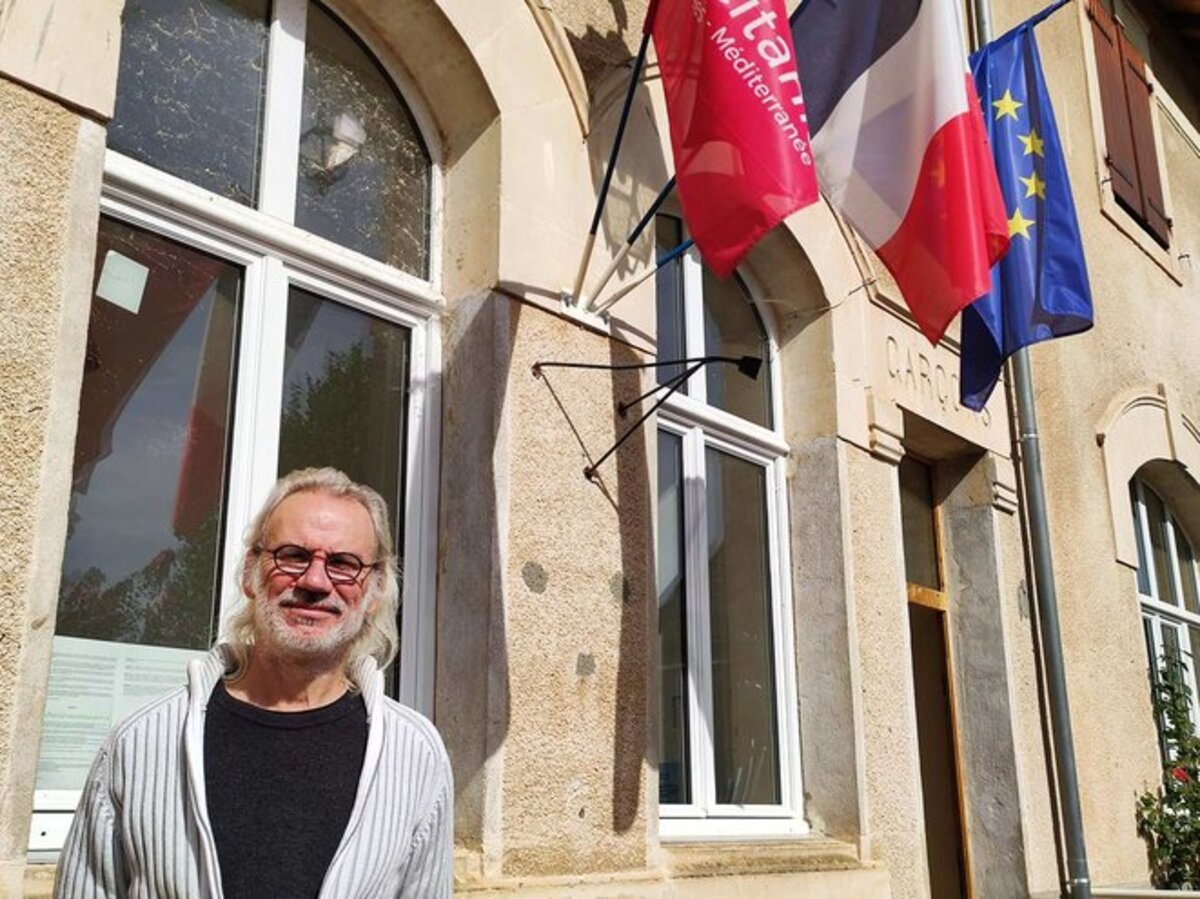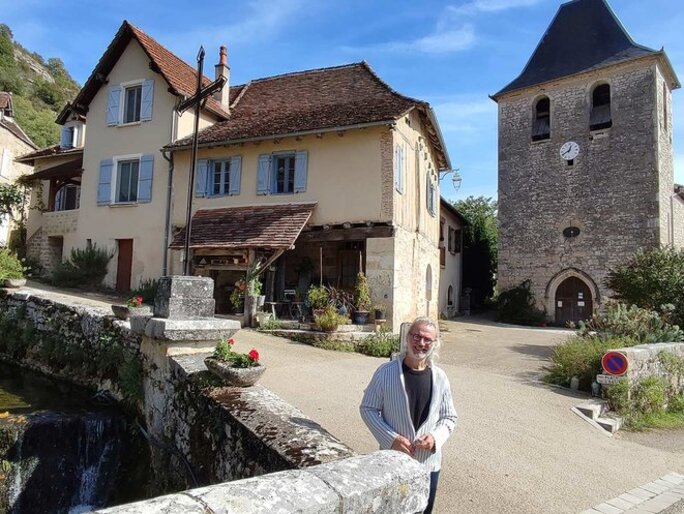The village of Corn is nestled in a small valley at the heart of the vast Causses du Quercy nature reserve in the Lot département (county) of south-west France. To all outside appearances, this village of 240 inhabitants is a peaceful and happy place, situated between the river Célé, which flows down from the Massif Central, and a limestone plateau (“causse” in French) which overlooks it.
The active population of Corn (pronounced “qor”) is busy in a diverse mix of activities and include farmers, small craftsmen, public sector employees, workers with the aeronautical manufacturing plants in the neighbouring town of Figeac – something of a local metropolis of 10,000 inhabitants some 15 kilometres away – as well as a few artists. The village also has a fair number of retired residents.
Like elsewhere in rural France, the successive lockdown restrictions imposed since early last year to contain the Covid-19 pandemic were broadly less testing to live through in Corn than in urban areas. What’s more, the spread of the coronavirus was relatively weak. “We had no deaths from Covid in the commune,” said the village’s mayor, Dominique Legresy. “We had a few who fell ill, with different degrees of severity, but without leading to hospitalisation.” He readily describes himself as “privileged” in comparison to town dwellers, notably with his vegetable garden lying less than two kilometres away.
But despite all that, Corn has not emerged unscathed from the 19 months of the health crisis. “In our spot, the coronavirus didn’t kill anyone, but the lack of social relations did,” said Legresy, 53, who is now into his second six-year term as mayor of the village. “It was an elderly lady who walked a great deal, very active. But like a lot of the elders, she shut herself away in her home because the government said they must stay there.” He is convinced that the woman died from the combined effects of a lack of activity and social isolation.

Enlargement : Illustration 1

The mayor spoke of how many of the elderly in the region have a strong fear of running foul of the gendarmerie. “These folk either lived through the Second World War themselves, or were fed with the accounts of what their parents experienced during the war,” he said, referring to the repressive role played by the gendarmerie under the orders of the collaborationist Vichy regime during the 1940-1944 German occupation of France. “When the gendarme says you must stay at home, they obey.”
Legresy denounced what he described as an overzealous approach by the gendarmerie, which polices mostly rural areas, during the lockdowns, when they “succeeded in making people very afraid”. He notably cited an incident involving an elderly man who was stopped by a gendarmerie patrol after stepping out of his house to take his rubbish to bins 20 metres away.
The lockdown periods remain a sore memory for the mayor: “At that time I was still working as a carer for people with special needs. We were [on call] 24 hours per day for 62 successive days, ready to intervene at any moment. I was permanently in danger of being infected [by the coronavirus], and in those conditions it seemed to me risky to visit elderly people. People then closed in on themselves. That changed relationships, the image became blurred.”
If recalling the period is painful for Legresy, who describes himself as a “humanist and ecologist”, it is also because he lost his professional job through the pandemic. He refused to be vaccinated against Covid-19 as required by his public administration employers. They also disallowed the alternative of regularly testing for the virus. As a result, he was suspended from duty in early September, after which he handed in his resignation. He rejects being associated with the anti-vax movements, insisting that his argument is simply about people having the freedom to choose one way or the other.
“For me, it was decided from the start,” he explained. “There was no question of having my body injected with this product that is a phase-3 experiment in real-life conditions. It’s not ideological, it’s a gut reaction.” He described leaving his employment as “heart-breaking”, adding: “I’ve 27 years in the job, and I was treated like a villain.”

Enlargement : Illustration 2

Legresy regards the heated arguments over vaccination and the so-called health pass ("pass sanitaire") – which takes the form of a QR code attesting that a person has been either fully vaccinated against, or recently recovered from, Covid-19, or who has tested negative for the virus within the past 48 hours, and which is required to access various public venues – as having “poisoned” social relations. As an example, he said: “During the lockdowns, we were four carers permanently present for seven young people with four different conditions [of handicap],” he recalled. “I came close to being killed by a youngster having a fit and who wanted to hit me with a stone. But today I’m treated like a murderer when I demonstrate against the [health] pass in Figeac. The heroes of yesterday are made into the pariahs of today.”
In carrying out his mayoral duties, Legresy endeavours to stick to his principles while remaining within the limits of the law. He refuses to become involved in controlling the vaccinal situations of the village’s two municipal employees. “I told them that I didn’t want to know about whether they were vaccinated or not. If the prefecture [government administration office] asks me for information on the subject, they can go to the workplace health inspection services,” he said. “Given that there are none in the Lot, they’ll have to hire a workplace doctor, but that’s not my business.” Similarly, he says he would not react if a municipal councillor “had not had their nose swabbed”.
“After all, I’m elected by the people. How could I be suspended? To be unable to welcome people to the communal hall poses a problem for me. So, I get by, I try to find ways to allow things to happen without opposing the law.”
For Legresy, the government’s decision to bring to an end the free testing for Covid-19, effective as of October 15th and which is seen as encouraging use of the health pass, is confirmation of his argument. “The health pass is another name for obligatory vaccination,” he said.
Since the ending of free testing this month, PCR (polymerase chain reaction) tests, processed in laboratories, cost 43.89 euros, while rapid antigen tests (also called lateral flow tests) carried out in chemist shops cost between 25 and 30 euros. However, they remain free of charge for certain categories of people, including those who have a doctor’s prescription for the test, minors, and those identified through the tracing of the contacts of a person infected.
“Now that the test is charged for, the pass becomes the de facto synonym for vaccination,” said Legresy. “Who can afford to be tested twice a week, now that the [requirement for the] pass is to be prolonged up until next summer?”
-------------------------
- The original French version of this report, one in a series of four, can be found here.
English version by Graham Tearse


